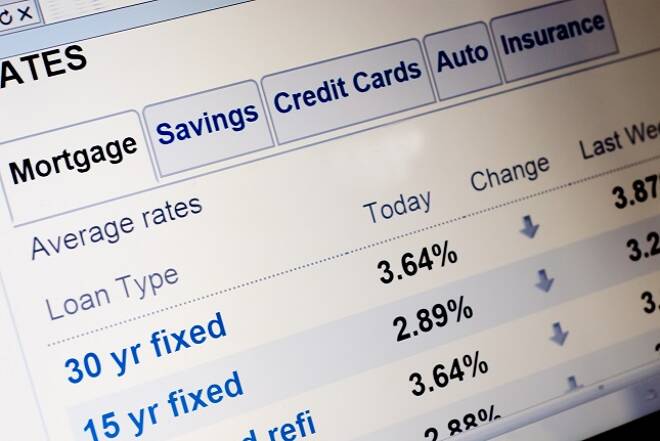Advertisement
Advertisement
U.S Mortgage Rates Down Again as Applications Rebound
By:
Mortgage rates dipped for a second consecutive week in the U.S, with geo-political risk driving demand for Treasuries ahead of the weekend G7 Summit that will likely see Trump stir the trade pot even more.
Mortgage rates fell for a 2nd consecutive week in the week ending 7th June, which supported a bounce in the number of mortgage purchases.
In spite of continuingly strong demand, attributed to a constraint in inventories, growth rate of purchase loan balances have eased through the first half of the year and more so since March, with the pace of house price rises and the upward trend in mortgage rates impacting.
For now, the good news is that labour market conditions continue to improve, with wage growth also on the rise, though wage growth may not be able to keep up with the upward momentum in house prices should there not be an inventory build-up through the summer.
Economic data released through the week included May’s ISM service sector PMI, which impressed, providing further evidence of a pickup in economic activity through the second quarter, while U.S factory orders dipped in April, according to figures released at the start of the week.
With data on the lighter side, U.S Treasury yields were in the hands of the Oval Office through the week, with the markets looking ahead to the G7 Summit on Friday and Saturday, market fears of a trade war driving demand for U.S Treasuries that led to a pullback in yields, easing pressure on mortgage rates.
Adding to the demand for U.S Treasuries was concern over the newly voted in Italian coalition government that is expected to begin ruffling the EU’s feathers with its populist policies that defy Brussels and the Establishment.
Freddie Mac weekly average rates for new mortgages as of 7th June were quoted to be:
- 30-year fixed rate loan slipped from 4.56% to 4.54% last week, while up from 3.89% a year ago.
- 15-year fixed rates fell from 4.06% to 4.01% last week, while up from 3.16% from a year ago.
- 5-year fixed rates fell from 3.80% to 3.74% over the week, while up from last year’s 3.11%.
Mortgage Bankers’ Association Rates for the week ending 6th June were quoted to be:
- Average interest rates for 30-year fixed, backed by the FHA fell from 4.85% to 4.77%, easing further from 23rd May’s 7-year high.
- Average interest rate for 30-year fixed with conforming loan balances rose slipped from 4.84% to 4.75%.
- Average 30-year rates for jumbo loan balances decreased from 4.73% to 4.70%.
Weekly figures released by the Mortgage bankers Association showed that the Market Composite Index, which is a measure of mortgage loan application volume, rose by 4.1%, following the previous week’s 2.9% fall week-on-week. The rise coming off the back of slide in mortgage rates in the week ending 30th May.
The Refinance Index also rose, up 4% to recover from its lowest level since Dec-2000 in the week ending 30th May, following the previous week’s 4% fall, with the refinance share of mortgages rising from 35.3% to 35.6%, the recent downward trend hitting the brakes.
For the week ahead, updates from the G7 Summit will certainly have an impact on demand for U.S Treasuries and ultimately mortgage rates, with any increased risk aversion likely to see yields fall further back, Trump’s desire for a trade war a negative, not only bad for the Chinese and U.S economies, but the global economy in general.
On the data front, U.S May inflation numbers on Tuesday, the FOMC’s release of the economic projections, statement and anticipated rate hike on Wednesday evening, retail sales figures on Thursday and June consumer sentiment numbers on Friday will influence.
With a June rate hike largely priced in, key will be the economic projections and the FOMC’s tone, with any suggestions of a more aggressive rate path through the second half of the year, likely to lead to a bond rout that would see yields and mortgage rates rebound.
How responsive the markets will be to the FED and the stats will ultimately boil down to the noise from the Oval Office and from Italy however, with the North Korea – U.S Summit also scheduled to take place in the coming week adding to the geo-political risk that has riled the markets of late
Retaliatory action by G7 members and China, in response to current steel and aluminium and any additional trade tariffs would certainly put the markets into a ‘risk-off’ frenzy and, while this may be a good thing for mortgage rates over the near-term, any threat of a disruption to the U.S and global economies is never a good thing, particularly for prospective home buyers.
About the Author
Bob Masonauthor
With over 28 years of experience in the financial industry, Bob has worked with various global rating agencies and multinational banks. Currently he is covering currencies, commodities, alternative asset classes and global equities, focusing mostly on European and Asian markets.
Advertisement
